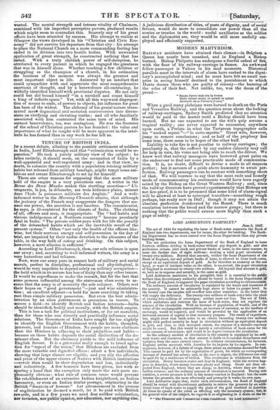MODERN MARTYRDOM.
RAILWAY accidents have attained their climax—in-Belgium a Queen has nearly been smashed, and in England a Bishop burned. Bishop Philpotts has undergone a fearful ordeal of fire, with the floor of his railway-carriage in flames. An awkward fellow-passenger is Vulcan in his mad moments. Historical parallels must in the intervals of alarm have rushed to the digni- tary's accomplished mind ; and he must have felt no small sur- prise in seeing himself destined to the punishment to which Dante dooms those who are guilty of simony—the burning of. the soles of their feet. Not unlike, too, was the doom of the proud-
" Sanza riposo mai era Is trams
Della misere Mani, or (mind' or cannel Iscatenda do as rarsura fresco,"
When a good many plebeians were burned to death on the Paris and Versailles Railway, and the question arose about the locking of railway-carriages, Sydney Smith predicted that no attention would be paid to the matter until a Bishop should have been burned. But no one expected to see the wit's quip assume a tragical reality ; one never expected to encounter, anywhere upon earth, a Prelate in what the Tartarean topographer Calls his "cooked aspect"—" lo cotto aspetto." Great wits, however, jump to remote conclusions; and as half of the prophecy has come true, there seem to be hopes of the other half.
Liability to take fire is not peculiar to railway carriages; the peculiarity is, that the sufferer by any sudden calamity may call for help in vain, his voice not being able to reach the driver. We know well that railway managers have bestowed great pains on the endeavour to find out some practicable mode of communica- tion. It is, no doubt, difficult to devise a mode in all respects perfect ; but it savours of a pride above humanity to await per- fection. Railway passengers can be content with something short of that. We will venture to say that the most rude and homely mode of communicating his sentiments would have been eagerly seized by the Bishop on the Great Western Railway; and, since the railway directors have proved experimentally that Bishops are not fire-proof, it is to be presumed that some kind of alarm-signal will be allowed at least to episcopal travellers—something rough perhaps, but ready now in 1847; though it may not attain the absolute perfection desiderated by the Board. There is much emulation between the broad and the narrow gauge; but there is nothing that the public would esteem more highly than such a gage of safety.
























 Previous page
Previous page